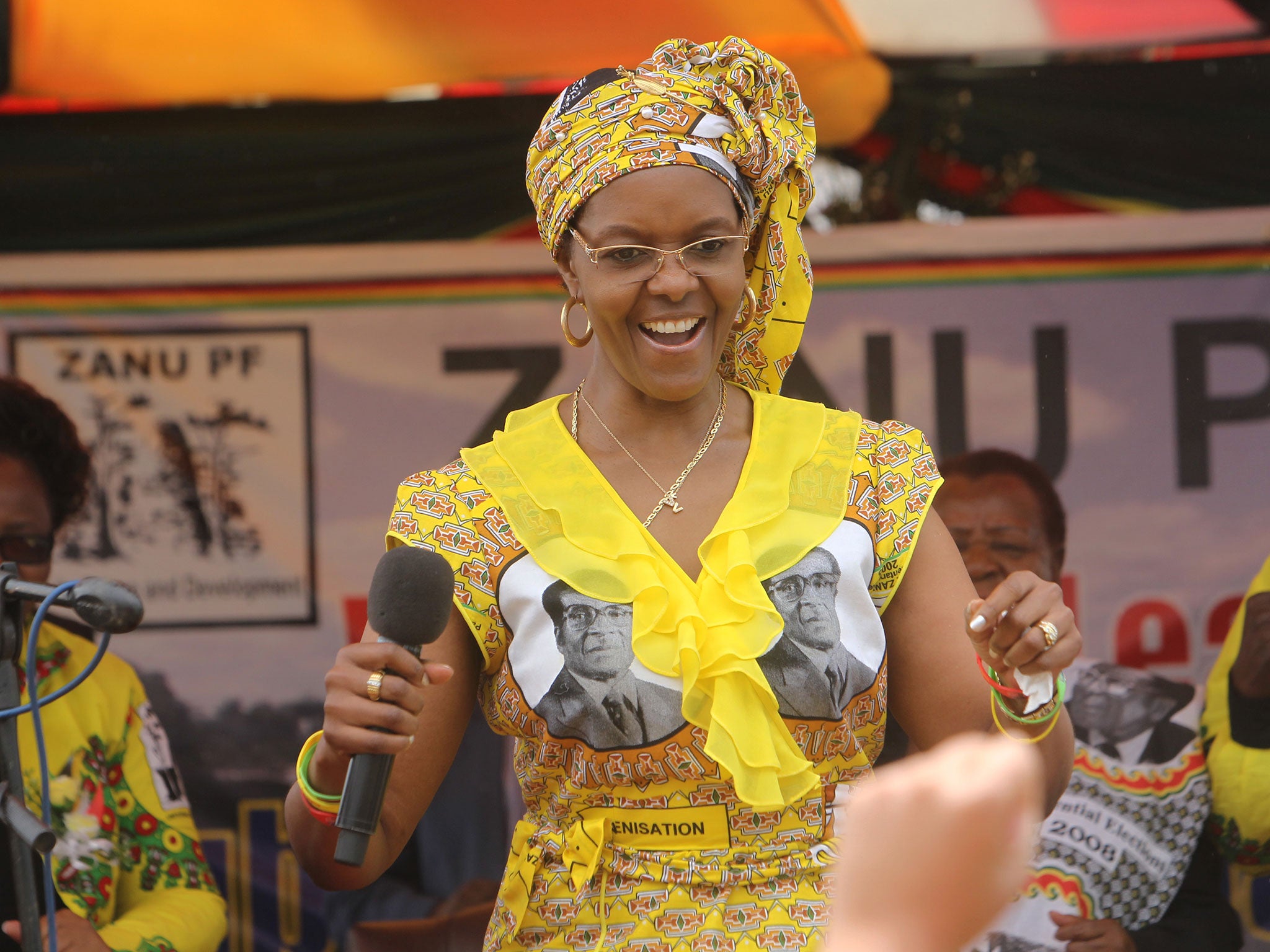Grace Mugabe: Who is Zimbabwe's fugitive First Lady and why has she fled?
Longtime leader Robert Mugabe, 93, reportedly under house arrest following army takeover

Your support helps us to tell the story
From reproductive rights to climate change to Big Tech, The Independent is on the ground when the story is developing. Whether it's investigating the financials of Elon Musk's pro-Trump PAC or producing our latest documentary, 'The A Word', which shines a light on the American women fighting for reproductive rights, we know how important it is to parse out the facts from the messaging.
At such a critical moment in US history, we need reporters on the ground. Your donation allows us to keep sending journalists to speak to both sides of the story.
The Independent is trusted by Americans across the entire political spectrum. And unlike many other quality news outlets, we choose not to lock Americans out of our reporting and analysis with paywalls. We believe quality journalism should be available to everyone, paid for by those who can afford it.
Your support makes all the difference.Grace Mugabe, the wife of Zimbabwe’s President, has reportedly fled to Namibia in the wake of an army takeover of the government.
Her husband Robert Mugabe, 93, is thought to be under house arrest in the country’s capital Harare, after generals seized power and detained senior officials in a round-up of “criminals”.
Some commentators think this is a way of installing the longtime leader’s deputy as president.
Mr Mugabe sacked Emmerson Mnangagwa last week in a move that was widely seen laying the groundwork for Ms Mugabe to succeed her husband.
But who is the First Lady and mooted presidential successor?
The affair
Grace Mugabe was a secretary in the president’s office when the two began an affair. Robert Mugabe was married to his first wife, Sally, at the time.
As his spouse was suffering from the kidney failure that eventually killed her in 1992, Mr Mugabe had two children with Grace, who split with her own husband.
When they married in 1996, the wedding was attended by Nelson Mandela and other African leaders.
The 52-year-old South African-born First Lady has seen her profile rise in the past few years and in recent months has fiercely defended her ailing husband, declaring that he should run “as a corpse” in next year’s election if he dies before the vote.
The assault allegations
The First Lady was caught up in controversy earlier this year when a South African model accused her of whipping her with an extension cord in a Johannesburg hotel room.
Ms Mugabe was granted diplomatic immunity by South Africa despite calls for her prosecution. She later accused the 20-year-old of being the aggressor.
She was also accused of assaulting a British journalist who tried to photograph her while she was shopping in Hong Kong in 2009.
But she escaped charges through diplomatic immunity.
“Her controversies will not do much to stop her. In [the ruling party] Zanu-PF, they seem to be accepting her as her husband’s successor. The problem might be getting the support of other Zimbabweans who feel she is simply not presidential material,” said Harare-based political analyst Alex Rusero before the latest developments.
The money
Despite an often abrasive manner, Ms Mugabe’s commanding presence and charity work have won support from some Zimbabweans.
But while she often displays her charitable side, talking about how she takes care of orphans at a farm near the capital, Harare, she also faces criticism for lavish personal spending.
Last month the “First Shopper”, as her opponents like to call her, approached a Harare court to recover more than $1m (£760,000) she said she paid to a Lebanese person for a 100-carat diamond ring.
Such actions have frustrated many in the once-prosperous southern African nation whose economy has fallen apart in recent years.
The growing power
The First Lady emerged to become her husband’s chief defender in 2014, when she led the firing of Joice Mujuru, the Vice-President and potential successor to the President. The same year, Ms Mugabe was appointed to head the ruling party’s women’s league.
In recent weeks the First Lady and her husband had openly criticised Mr Mnangagwa, a longtime ally of the President.
Earlier this week the President accused his former deputy of plotting to take over, including via witchcraft, while Mr Mnangagwa said in a statement he had left the country after threats to his life.
At a rally over the weekend, Ms Mugabe displayed her own presidential ambitions.
“So I have said to the President, you can also leave me in charge,” she told the crowd. ”You can also give me your position. Give me the job and I will do it very well because I am good. I can do a great job.”
The challenge
Earlier this year the First Lady broke taboo and openly told her husband to choose a successor, saying it would “enable all members to rally behind one candidate”.
Mr Mugabe has said he wants to rule for life, although he has showed signs of trouble walking and has travelled to Singapore frequently for medical attention. He has not publicly indicated a successor.
But after Mr Mnangagwa’s firing, some ruling party officials openly advocated for the First Lady to take his place.
“The only person possessing such qualities is the leader of the women’s league, none other than her excellency Dr Grace Mugabe,” youth league leader Kudzai Chipanga told reporters.
While the First Lady would likely have had to contend with other allies of the President, including military commanders who served during the fight for independence from white rule, party provincial assemblies had already tried to expel dozens of senior members who supported Mr Mnangagwa.
Join our commenting forum
Join thought-provoking conversations, follow other Independent readers and see their replies
Comments